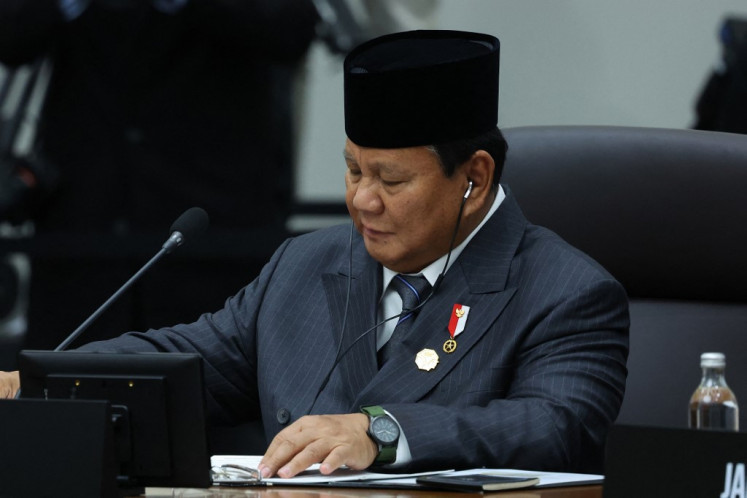Popular Reads
Top Results
Can't find what you're looking for?
View all search resultsPopular Reads
Top Results
Can't find what you're looking for?
View all search resultsCandidates urged to develop clear vision on health
The Islamic Students Health Organization National Coordination Board (Bakornas LKMI), an institution affiliated with the Association of Islamic Students (HMI), says presidential-vice presidential candidate pairs must have a clear vision on national health development, in conjunction with an aspiration to guarantee the health of the population
Change text size
Gift Premium Articles
to Anyone
T
he Islamic Students Health Organization National Coordination Board (Bakornas LKMI), an institution affiliated with the Association of Islamic Students (HMI), says presidential-vice presidential candidate pairs must have a clear vision on national health development, in conjunction with an aspiration to guarantee the health of the population.
'Health should be a priority in national development due to its great influence on the quality of this nation's future generations. Any presidential candidate with a lack of commitment to health development must also have an inadequate vision for the nation as a state leader,' Bakornas LKMI director Ardiansyah Bahar said in a statement made available to The Jakarta Post on Sunday.
'We should have hope that the next Indonesian president is someone who has a strong vision for this nation's heath development,' he went on.
During a meeting attended by Bakornas LKMI officials from regions across Indonesia on Saturday, it was highlighted that the LKMI would continue to urge presidential and vice-presidential candidates to remain committed to improving the health of Indonesians.
'The presidential candidates and their running mates should be able to keep prioritizing the health development agenda, not only during the presidential campaign but also if they are elected to carry out their duties as state leaders,' Ardiansyah said.
Indonesia, he said, was still facing serious health challenges, as outlined in the 2013 Basic Health Research (Riskesdas) released by the Health Ministry.
'The prevalence of malnourishment in children under five years stood at 19.6 percent in 2013, up from 17.9 percent in 2010. Stunting in children also remains a major public health problem in Indonesia, for which the national figure stood at 37.2 percent in 2013,' said Ardiansyah, adding that the government should make nutrition a main focus of its health development programs.
In terms of non-communicable diseases, the 2013 Riskesdas showed that the prevalence of Tuberculosis (TB) stood at around 0.4 percent in 2013, unchanged from the 2007 figure.
The data also shows that the prevalence of 15-year-old smokers increased to 36.3 percent in 2013 from 34.2 percent in 2007.
'It seems the government is still somewhat reluctant in carrying out programs to prevent [the negative] health effects of cigarette smoking. While other countries have ratified and signed the Framework Convention on Tobacco Control (FCTC), Indonesia ' despite being a country with a very high level of cigarette consumption Â' has not yet ratified it. Indonesia is the only Asian country that has not yet ratified and signed the convention,' said Ardiyansyah.
He said presidential-vice presidential candidate pairs should give real political support to resolving such problems instead of merely using health-related issues as a strategy to boost popularity. (ebf)










